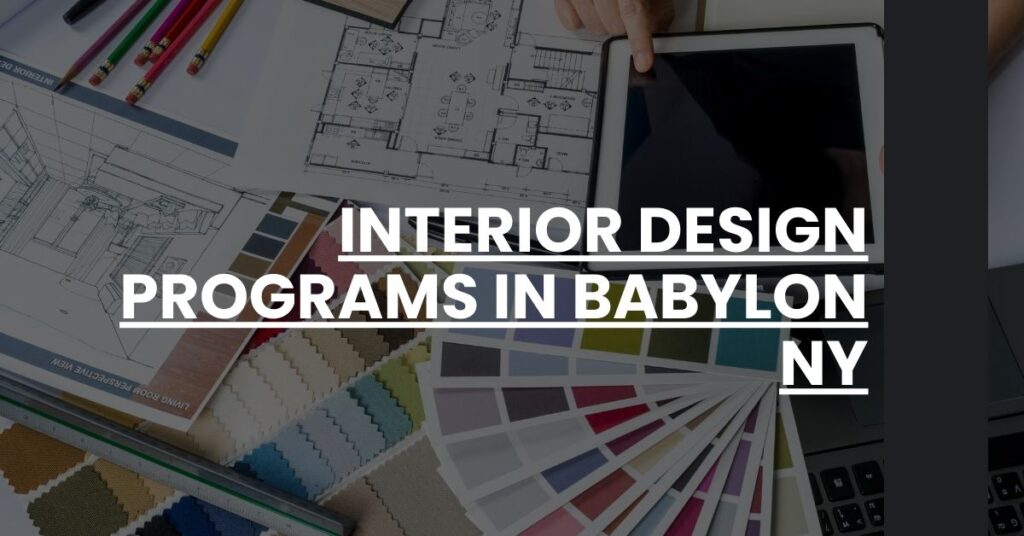Not in Babylon? Check out our lists of Interior Design Programs in Buffalo, Hempstead, Huntington, Islip, New York City, North Hempstead, Oyster Bay, Ramapo, Rochester, and across New York.
Looking to become a top-notch interior designer?
Discover the best Interior Design Programs in Babylon NY.
This article highlights the premier educational choices in the area, detailing curriculum strengths, hands-on opportunities, and faculty expertise to help you make an informed decision.
Suffolk County Community College – Interior Design Program
The Interior Design Program at Suffolk County Community College stands out as an exceptional choice for anyone looking to pursue interior design in Babylon, NY. Located on the Ammerman Campus in Selden, this program offers more than just a standard education; it provides a vibrant learning environment with over 13,000 enrolled students.
You can expect a well-rounded curriculum that covers essential areas such as:
- Design Principles: Learn the fundamentals of design that form the backbone of any successful interior design project.
- Color Theory: Understand how colors interact and how to use them effectively to create aesthetically pleasing spaces.
- Space Planning: Gain skills in arranging interior spaces to maximize functionality and aesthetics.
- Materials and Finishes: Get acquainted with different materials and finishes, their properties, and best use cases.
- CAD Software: Master industry-standard software tools that are essential for modern interior design.
- Sustainable Design Practices: Learn eco-friendly design techniques and sustainable material usage, which are increasingly important in today’s design landscape.
Faculty Expertise
One of the most significant advantages of this program is its highly experienced faculty. You will learn from seasoned professionals who are experts in the field of interior design. These instructors are committed to not only teaching theory but also providing practical insights and real-world applications.
Cost and Accessibility
A notable feature of Suffolk Community College is its affordability. With the lowest college tuition on Long Island, this program offers a cost-effective pathway to a quality education. Moreover, you can benefit from financial aid options that may ease the financial burden.
The program is also exceptionally flexible, offering day, evening, and weekend classes. This makes it easier for you to balance other commitments such as work or family responsibilities.
Practical Experience
The Interior Design Program emphasizes hands-on experience through internships and cooperative education. These practical components let you apply what you’ve learned in real-world settings. This not only enriches your education but also enhances your resume, setting you apart in a competitive job market.
Community and Support
Suffolk County Community College prides itself on being a student-centered community. You’ll find an inclusive and supportive environment aimed at helping you succeed. The admissions process is competitive, so it’s crucial to ensure that your application meets all the necessary requirements and stands out to the selection committee.
Whether you are a recent high school graduate or an adult learner, the Interior Design Program at Suffolk County Community College provides a thorough and affordable education in interior design, preparing you for a successful career in the field.
Factors to Consider When Choosing an Interior Design Program
Selecting the right interior design program is a crucial step in shaping your future career. Here are some essential factors to consider:
- Curriculum Quality: Your chosen program should cover key topics like design principles, color theory, space planning, materials, and finishes. It should also have modules on CAD software and sustainable design practices.
- Hands-on Opportunities: Programs that offer internships, cooperative education, or project-based assignments enable you to gain practical experience. This is invaluable when it comes to applying classroom knowledge and building a professional portfolio.
- Faculty Expertise: The experience and qualifications of your instructors can significantly affect the quality of your education. Look for programs where faculty members are industry veterans with substantial field experience.
- Institution Reputation: Graduates from well-regarded programs often enjoy better job prospects. Research the program’s reputation within the industry, read reviews, and consider alumni success stories.
- Networking Opportunities: Look for programs that offer networking opportunities through events, workshops, or partnerships with industry organizations. Building connections can open doors to internships, job opportunities, and collaborative projects.
- Location: Proximity to major cities or design-centric communities can offer additional exposure and opportunities. If the program is near design hubs, businesses, and internship opportunities, it can enhance your educational experience.
- Cost: Evaluate the total cost of the program, including tuition, fees, materials, and living expenses. Financial aid, scholarships, and grants can make a significant difference in your budgeting. An affordable program doesn’t necessarily mean a compromise in quality.
- Accreditation: Ensure the program is accredited by relevant professional organizations, such as the Council for Interior Design Accreditation (CIDA). Accreditation confirms that the program meets industry standards and can be vital for licensure and certification.
By focusing on these aspects, you’ll be able to select an interior design program that aligns well with your career aspirations, educational needs, and financial situation.
Conclusion
When looking for top-tier interior design programs in Babylon, NY, consider the comprehensive curriculum and hands-on experience offered by Suffolk County Community College. This program, coupled with its affordability and flexibility, prepares you well for a successful career in interior design.
Explore your options and take the next step toward an exciting and creative career.
Factors to Consider When Choosing an Interior Design Program
When selecting an interior design program, some important elements can shape the quality of your education and future career. Here are critical factors to keep in mind:
- Curriculum Quality: Ensure the program covers essential topics such as design principles, color theory, space planning, materials and finishes, CAD software, and sustainable design practices.
- Hands-on Opportunities: Programs offering internships, cooperative education, or project-based assignments provide the chance to apply classroom knowledge in real-world scenarios, which is crucial for building a professional portfolio.
- Faculty Expertise: Experienced faculty play a pivotal role in your education. Look for programs where instructors are seasoned professionals with substantial industry experience.
- Institution Reputation: Choose programs with a strong reputation within the industry. Positive reviews, alumni success stories, and the overall standing of the college or university can make a difference in your job prospects.
- Networking Opportunities: Seek programs that offer networking events, workshops, and industry partnerships for valuable connections that can lead to internships, job placements, and collaborative projects.
- Location: Proximity to design hubs, businesses, and internship opportunities can enhance your learning experience. Being near major cities or design-centric communities offers additional exposure.
- Cost: Consider tuition, fees, materials, and living expenses. Evaluate financial aid options, scholarships, and grants to manage costs without compromising on education quality.
- Accreditation: Verify if the program is accredited by relevant organizations like the Council for Interior Design Accreditation (CIDA), which is essential for meeting industry standards and achieving licensure or certification.
Project-Based Learning
Project-based learning is an integral component of many interior design programs. Here’s why it matters:
- Skill Application: Working on real projects helps you apply theoretical knowledge. This reinforces learning and enables you to develop practical skills.
- Portfolio Building: Completing projects adds work to your portfolio, showcasing your abilities to potential employers.
- Feedback and Iteration: Projects typically involve feedback cycles, offering you the chance to refine your work based on constructive criticism.
Consider these elements when evaluating interior design programs to ensure they meet your educational needs and career goals.
Financial Aid and Scholarships
Financial considerations are crucial. Here are some avenues to explore:
- Federal Aid: Apply for federal student aid through FAFSA. Federal grants and loans can significantly reduce out-of-pocket expenses.
- State Aid: Investigate state-specific financial aid programs. New York offers various grants and scholarships for residents.
- Institutional Aid: Many colleges provide their own scholarships and grants based on merit, need, or both.
- Private Scholarships: Search for scholarships offered by private organizations, foundations, and industry associations.
Applying for multiple financial aid options increases your chances of receiving funds and reducing your educational costs.
Accreditation Importance
Accreditation ensures that a program meets set standards of quality. An accredited program gives you a competitive edge:
- Quality Education: Accredited programs adhere to high educational standards, enhancing the quality of your learning experience.
- Professional Recognition: Graduates from accredited programs are often preferred by employers.
- Licensure and Certification: Accreditation is mandatory for licensure and certification in many states.
Make sure the program you select is accredited to ensure it meets industry standards.
Suffolk County Community College – Interior Design Program
The Interior Design Program at Suffolk County Community College is an excellent choice for anyone serious about starting a career in interior design. Here’s why:
- Comprehensive Curriculum: The program covers crucial areas such as design principles, color theory, space planning, and materials. It also includes CAD software and sustainable design practices to ensure you are well-prepared for modern design challenges.
- Experienced Faculty: Learning from seasoned professionals in the field ensures you gain real-world insights and invaluable expertise.
- Affordability: SUNY Suffolk offers the lowest college tuition on Long Island. This makes it a financially sound option for many students.
- Flexibility: With options for day, evening, and weekend classes, you can balance other commitments while pursuing your education.
- Hands-on Experience: The program emphasizes practical experience through internships and cooperative education, enabling you to develop a strong portfolio and real-world skills.
- Student-Centered Community: The inclusive and supportive environment at Suffolk promotes personal and academic growth, setting the stage for your future career in interior design.
Whether you’re a recent high school graduate or a professional change seeker, this program provides the education and support you need to succeed.
Conclusion
Choosing the right interior design program can set the foundation for your future career. Suffolk County Community College’s Interior Design Program offers a robust curriculum, experienced faculty, and valuable hands-on experience at an affordable cost.
Explore your educational options and take the first step towards a rewarding career in interior design in Babylon, NY.

